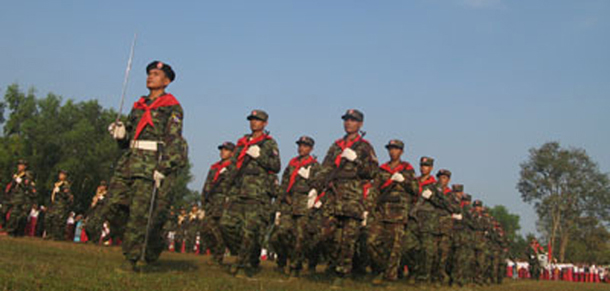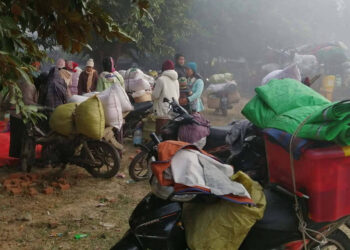The New Mon State Party (NMSP) has threatened to break its four-month-old ceasefire agreement with the Burmese government if Naypyidaw fails to hold political talks with all the ethnic armed groups by the end of this year, according to the party secretary.
“We requested in December that the government hold political talks with each and every ethnic armed group,” said NMSP secretary Nai Hang Thar. “But we don’t see any signs that they will do it. If they do not hold negotiations, we will renounce the ceasefire.”
He said the leadership of the NMSP met with Mon community leaders on Sunday in Sangkhlaburi in western Thailand to update them on the progress of peace talks with the central government. They told the community leaders that “signs were not good” because “the government only wants to maintain a ceasefire. They don’t actually want to engage in political dialogue.”
According to Nai Sunthorn, the chairman of the Mon Unity League: “I proposed to the NMSP leaders [on Sunday] that they concentrate on two important issues when they talked with the government. One was a military settlement; the other was ethnic education. Without a resolution to these two issues, there can be no win-win situation in this political game.”
The NMSP have already set up liaison offices in Mon State following the party’s signing of a peace agreement with a government delegation on Feb 1 this year in Moulmein, the capital of Mon State.
The NMSP sent a delegation to meet with government representatives in Naypyidaw in April. Nai Hang Thar said that the Mon party repeatedly requested that Naypyidaw allow Mon language to be taught in state schools, but that the government would only agree to permit Mon language to be taught at weekend classes.
He said that the NMSP leaders were unsatisfied with their previous meetings because the government pressured them to form a new political party and join in the political process, including running in elections and entering parliament.
“We found that their current peace plan was similar to the former one, which forced us to disarm, serve as a border guard force, and join the political process,” said Nai Hang Thar.
Several other ethnic groups in Burma are currently observing ceasefires while conducting further talks with government delegations. The Karenni National Progressive Party stated recently that it will not work on any “peace roadmap” put forward by Naypyidaw, but only an alliance based on the policies of the United Nationalities Federal Council, the main umbrella group of ethnic parties.
Despite ongoing peace talks, hostilities are flaring on a near daily basis between government troops and the Shan State Army- North, the Shan State Army– South and the Kachin Independence Army.

















